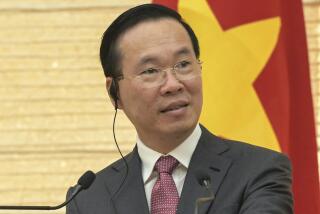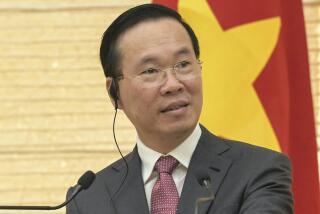From the Archives: Zhao Replaced by Hard-Liner; Other Key Positions Reshuffled
BEIJING -- China’s Communist Party fired reformist General Secretary Zhao Ziyang on Saturday and replaced him with Shanghai party chief Jiang Zemin, a technocrat and political hard-liner.
The appointment of Jiang, 62, as the new head of the 47-million-member party marks an attempt by Chinese leaders, in the wake of weeks of political turmoil, to carry on with the basic policies of the past decade: economic modernization and openness to the outside world paired with unyielding political dictatorship.
In a communique issued Saturday afternoon at the end of a two-day session of the party’s 170-member Central Committee, Zhao, 69, was accused of lending support to the recent wave of pro-democracy student protests--described in the document as “turmoils”--and of “splitting the party.”
‘Very Serious’ Mistake
“The nature and consequences of his mistake are very serious,” the communique said.
Hu Qili, 59, another key reformer once viewed as likely to eventually become head of the Communist Party, was also removed from his positions on the policy-setting Politburo Standing Committee and in the party secretariat, which oversees administrative matters.
Jiang is an electrical engineer who spent a year as a trainee at a Soviet automobile factory in 1955, then handled a succession of industrial and governmental jobs before becoming Shanghai mayor in 1985. He relinquished the mayor’s job in April, 1988, to become head of the city’s party organization, a more powerful post.
He is rumored to be a son-in-law of former President Li Xiannian, a hard-liner who still wields great influence, but this has never been officially confirmed.
In scenes from the Central Committee meeting broadcast on the evening television news, the bespectacled Jiang sat impassively, wearing a gray, high-buttoned Mao jacket like most of the other leaders present.
As part of the political shuffle, two reformist allies of Zhao--Rui Xingwen and Yan Mingfu--were removed from their posts in the party secretariat. The impact of this on China’s prospects for continuing reform was partially mitigated, however, by the selection of Li Ruihuan and Ding Guangen to replace them. Both Li and Ding have generally been considered reformists, at least on economic issues.
Li, 54, who is mayor and Communist Party chief in the important coastal city of Tianjin, was also promoted to the Politburo Standing Committee, together with Jiang and 72-year-old economist Song Ping, who is reputed to be in poor health. All three were already on the 16-member Politburo. They now join hard-line Premier Li Peng, Vice Premier Yao Yilin and Qiao Shi, who oversees China’s security apparatus, on the Standing Committee. With the removal of Zhao and Hu from that key body, its membership now rises from five to six.
The personnel changes were matched with promises that China’s basic reform policies will continue.
“The policy of reform and opening to the outside world, as the road to lead the country to strength and prosperity, must be implemented as usual in a steadfast manner,” the communique declared. “The country must not return to the old closed-door path.”
The personnel changes and rhetoric, taken together, are an indication that China will try to hold a steady course combining moderate economic reform and political repression.
The communique can be viewed as a firm statement that “basic economic reform is not to be rolled back,” an Asian diplomat commented.
Jiang and Li Ruihuan, the two leaders receiving the most significant promotions, “are people who handled their own areas reasonably well in the last two months,” this diplomat added. “Shanghai and Tianjin didn’t blow up, but these are also open areas. Shanghai and Tianjin have opened to the world.”
An unnamed Chinese government official quoted by United Press International said that the selection of Jiang “leaves people with hope.” If Qiao or Li Peng had been selected party chief, he said, “it would have shifted the balance too far.”
‘Enlarged Meeting’
While Central Committee approval is necessary to formally install a new general secretary, it appeared that the actual selection of Jiang as Zhao’s replacement was made at what the communique called “an enlarged meeting” of the Politburo, held June 19-21.
The technique of holding expanded meetings of the Politburo, common in times of crisis, enables elderly leaders who have formally retired from that top policy-making body to assert their authority over theoretically higher ranking but actually less powerful younger officials.
The communique reinforced the widespread perception that senior leader Deng Xiaoping, 84, together with about half a dozen other octogenarian revolutionaries--including President Yang Shangkun and former President Li Xiannian--continue to assert ultimate power in China.
Over the past two months, the communique said, the party has faced “a serious political struggle” against “premeditated political turmoils” and “a counterrevolutionary rebellion.” The Central Committee session “highly evaluated the significant role played in the struggle by veteran proletarian revolutionaries with Comrade Deng Xiaoping as their representative,” the communique said.
Jiang thus can be viewed as the choice of this fading older generation to be Deng’s eventual successor as China’s paramount leader.
Jiang does not appear, however, to have a strong enough political base in the party at the present time to assure his authority without the support of the elderly leaders who chose him. His selection thus does not eliminate the possibility of a serious succession crisis upon Deng’s death.
Shunted to Sidelines
The removal of Zhao from his post as general secretary had been foreseen for weeks. He was reportedly shunted to the sidelines and stripped of authority after opposing the decision to declare martial law in Beijing on May 20. He had last been seen in public on the morning of May 19, when he visited students then on hunger strike in Tian An Men Square.
It was only in the past few days, however, that Jiang’s name emerged in the Beijing rumor mill as a leading candidate to replace Zhao.
The Chinese media had previously given extensive signals that Qiao, the official in charge of security matters, was functioning as acting party head. But Qiao has long had a reputation as someone who seems content to be in a No. 2 position, and he lacks expertise in economic affairs.
Jiang is better equipped than Qiao to press forward with attempts to attract foreign investment to China in the face of worldwide condemnation of the brutal June 3-4 crackdown on pro-democracy protesters in Beijing. Hundreds, perhaps thousands, of people were killed that night as the People’s Liberation Army shot its way into central Beijing to clear protesters from Tian An Men Square.
Jiang is unlikely, however, to display much sympathy for the type of political liberalization that Zhao ultimately came to symbolize. Saturday’s communique made it clear that while attempts to modernize the economy will continue, China’s rulers intend to redouble efforts to crush any challenges to the Communist Party’s authority.
The party will “earnestly enhance ideological and political work and make great efforts to carry out education in patriotism, socialism, independence and self-reliance, plain living and hard work,” the communique declared. It also will step up efforts to oppose “bourgeois liberalization”--a phrase that refers to the spread of Western concepts of democracy and civil liberties.
Student Unrest
“Analyzing the country’s political situation over the past two months, the session pointed out that a very small number of people, taking advantage of student unrest, stirred up planned, organized and premeditated political turmoils in Beijing and some other places, which later developed into a counterrevolutionary rebellion in Beijing,” the communique stated.
“The aim of the turmoils and rebellion they incited was to overthrow the leadership of the Chinese Communist Party and to subvert the socialist People’s Republic of China,” it said.
Zhao, the communique said, holds “unshirkable responsibilities for the shaping-up of the turmoils.”
The communique praised Zhao as having made contributions “beneficial to the reform, the opening of China to the outside world and economic work” during his years as a top government and party leader, but it declared that he “obviously erred in guidelines and practical work.”
Zhao was accused of a “passive approach” to the principles of adherence to Communist Party dictatorship and opposition to bourgeois liberalization. He “gravely neglected party building, cultural and ethical development and ideological and political work, causing serious losses to the cause of the party.”
‘Look Further’
For these failures, Zhao was removed from all of his high party positions, including membership on the Politburo and the party Central Committee, and the post of first vice chairman of the Central Military Commission, the communique said. No mention was made of loss of party membership or possible criminal charges, but the party “decided to look further into his case,” the communique said.
Despite their demotions, Hu, Rui and Yan apparently retained membership on the Central Committee, which leaves open the possibility that they could eventually regain some influence should there be a reformist resurgence after Deng’s death.
More to Read
Sign up for Essential California
The most important California stories and recommendations in your inbox every morning.
You may occasionally receive promotional content from the Los Angeles Times.










